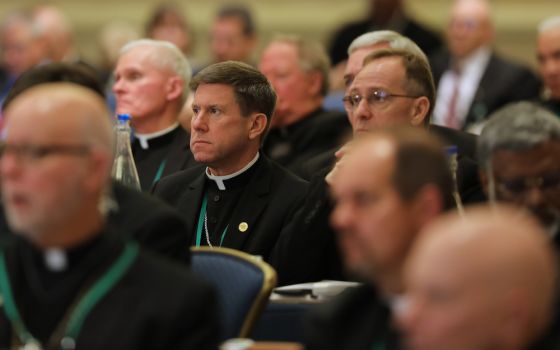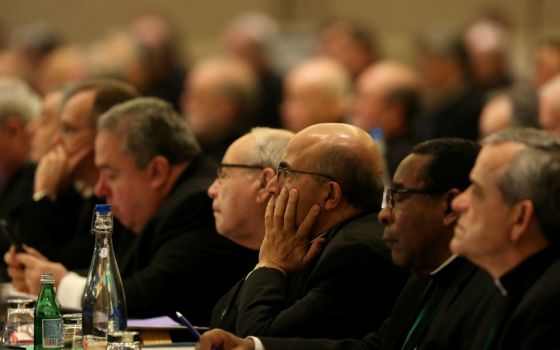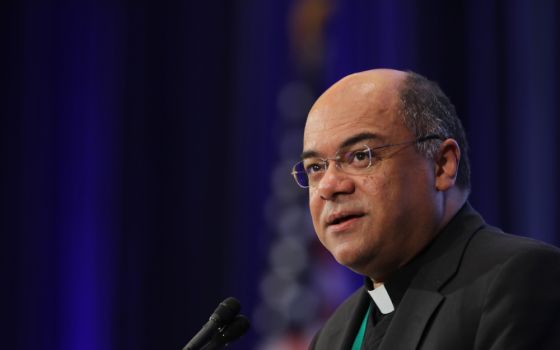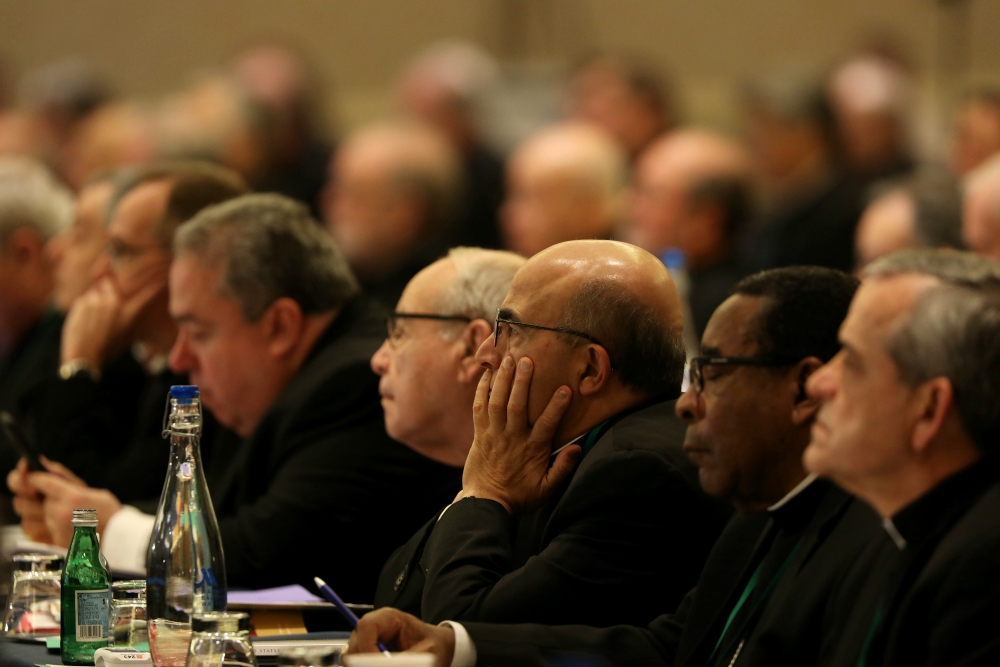
Bishops listen to a speaker during the fall general assembly of the U.S. Conference of Catholic Bishops in Baltimore Nov. 12. (CNS/Bob Roller)
After decades of a public face that has emphasized abortion, gay marriage and religious liberty, the body of the U.S. Catholic bishops is still debating how important other social and moral issues should be in their advocacy.
The most intense discussion during the Nov. 11-13 meeting here of the U.S. Conference of Catholic Bishops concerned whether opposition to abortion is the "preeminent" issue or not.
That discussion involved a letter to accompany the rerelease of a 12-year-old document, "Forming Consciences for Faithful Citizenship," which has not been significantly updated since the elections of both Pope Francis and President Donald Trump.
The lack of a more timely statement on today's political reality is "not reading the 'signs of the times,' as the Second Vatican Council instructed us to do. It's being stuck in time," said John Gehring, Catholic program director at the Washington D.C.-based Faith in Public Life, a progressive think tank and advocacy organization.
Gehring sees the bishops' debate over the prioritization of abortion as emblematic of a deeper struggle about how much to embrace Francis' vision for the church, with a clear majority of U.S. bishops still slow to respond to what he calls "the Francis moment."
"We're six years into the Francis papacy, and the bishops, as a body, are still dragging their feet when it comes to institutionalizing the pope's priorities," Gehring said. Yet he noted a few "cracks in the foundation" with more Francis-friendly bishops gaining some leverage in the conference.
But he warned that the bishops need to better navigate and message in a divided political system, "if they don't want to be written off simply as an appendage of one political party."
Although much of the bishops' fall plenary meeting focused on internal church affairs, such as liturgical translations, priestly formation, and the need to attract and retain younger Catholics, it also included some discussion and reports on politically relevant issues, including immigration, racism and gun violence.
The bishops' Committee on Pro-Life Activities gave a noticeably woman-centered presentation, calling for a yearlong program in which parishes and dioceses would offer support to pregnant women thinking about whether to carry their children to term. Called "Walking with Moms in Need," the program would begin in March.
The bishops also voted to begin developing a formal statement and comprehensive vision for Hispanic/Latino ministry in response to the synodal V Encuentro process. And they elected the first Latino as president of the conference, Los Angeles Archbishop José Gomez.
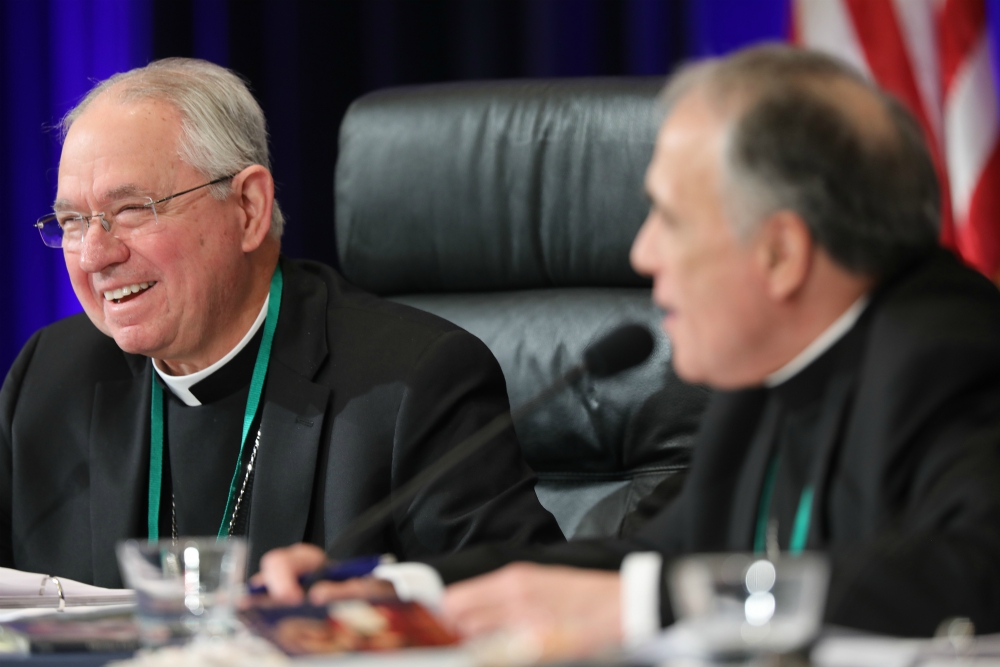
Los Angeles Archbishop José Gomez, president-elect of the U.S. Conference of Catholic Bishops, and outgoing president, Galveston-Houston Cardinal Daniel DiNardo, smile during the U.S. bishops' fall general assembly in Baltimore Nov. 13. (CNS/Bob Roller)
On the same day that the U.S. Supreme Court began hearing arguments to decide the fate of the Deferred Action for Childhood Arrivals (DACA) program, one bishop at the meeting urged action to protect the program and to find a permanent path to citizenship for undocumented immigrants.
But the bishops did not discuss or receive any report from the just-concluded Synod of Bishops for the Amazon, nor did climate change receive much attention. In fact, during a press conference, the outgoing bishops' conference president, Cardinal Daniel DiNardo of Galveston-Houston, called climate change "important" but not "urgent."
Political fireworks
Yet the fireworks, if there were any in an otherwise tepid meeting, involved the presentation from the bishops' working group on "Faithful Citizenship." Since the bishops had already decided last year not to issue a new document on political responsibility, this year's discussion and votes involved only supplementary materials: scripts for five videos and a letter to accompany the rerelease of the old document.
The video scripts, which passed overwhelmingly, encourage political engagement and support for the common good, using lists of multiple issues to cover broad ground.
One video starts with a young adult saying, "As Catholics we witness to the life and innate human dignity of all people. Those not yet born, victims of war and racism, persons with disabilities, migrants and refugees, families affected by poverty, those on death row. The elderly and those nearing the end of their lives."
One script pointedly includes this statement: "We are not aligned with any party, but we shine the light of our faith to influence parties to which we may belong."
Advertisement
But it is precisely a concern that the church appears aligned with the Republican Party that led to the debate over language about abortion in the letter for the "Faithful Citizenship" rerelease.
After urging participation in public life and contributions to the common good, the letter's third paragraph paraphrases Francis' apostolic exhortation on the call to holiness, Gaudete et Exsultate:
The call to holiness, he writes, requires a "firm and passionate" defense of the "innocent unborn." "Equally sacred," he further states, are the "lives of the poor, those already born, the destitute, the abandoned and the underprivileged, the vulnerable infirm and the elderly exposed to covert euthanasia, the victims of human trafficking, new forms of slavery, and every form of rejection."
That revised paragraph was the result of concerns raised by Chicago Cardinal Blase Cupich during the amendment and modification process. He had requested that the bishops quote more extensively from the papal document, including Francis' words about the danger of those who "relativize" social engagement, as if "the only thing that counts is one particular ethical issue or cause that they themselves defend," mentioning specifically the "defense of the innocent unborn."
In his written request for the longer quotation, Cupich cautioned about those who bring an "ideological mindset" to issues by either "dismissing some issues by labeling them as part of an objectionable political camp or by taking a reductionist approach in defending only one issue."
"From the beginning of his pontificate, Francis has made it clear that the unborn must be defended, but not to the exclusion of other issues of human dignity," Cupich wrote.
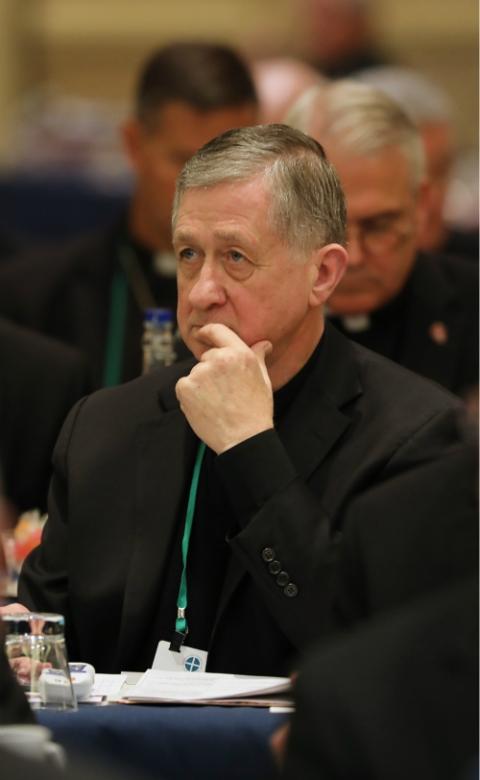
Chicago Cardinal Blase Cupich listens to a speaker during the U.S. bishops' fall general assembly in Baltimore Nov. 11. (CNS/Bob Roller)
Cupich also had called for changes to a section of the document that he believed gave "singular attention to abortion and does so in language that is tendentious and remarkably different from the treatment of other issues in the lines that follow, as other issues are raised," he wrote.
He noted that while the letter mentioned the environment, it did not contain even a full sentence on the climate crisis. On the matter of immigration, he urged "more candor" on the subject.
"We are not dealing simply with an 'absence of comprehensive immigration reform,' but rather a presence of demonizing rhetoric and abusive, violent policy directed at a group of human beings who are denounced as dangerous or worse by top elected officials," Cupich wrote.
The committee made minor additions and responses to Cupich's concerns, including a sentence that mentioned "gun violence, xenophobia, capital punishment and other issues that affect human life and dignity." It rejected, however, his call for the entire paragraph of papal quotation, out of concerns to keep the letter short.
Abortion language debate
Before the vote on the letter Nov. 12, Cupich rose from the floor to again ask for the longer papal quotation, referring to comments from the papal nuncio's opening speech at the meeting in which he encouraged the U.S. bishops to "reflect prayerfully" on their communion with the bishop of Rome.
Then San Diego Bishop Robert McElroy objected to a last-minute change in a section of the letter, which had deleted a reference to abortion as being "as important as ever" to now calling it "our preeminent priority."
In requesting that change, Archbishop Alexander Sample of Portland, Oregon, wrote, "We are at a unique moment with the upcoming election cycle to make a real challenge to Roe v. Wade, given the possible changes to the Supreme Court. We should not dilute our efforts to protect the unborn."
He was joined by three other bishops in suggesting the "preeminent" language: Archbishop Joseph Naumann of Kansas City, Kansas; Archbishop Paul Coakley of Oklahoma City; and Bishop James Conley of Lincoln, Nebraska.
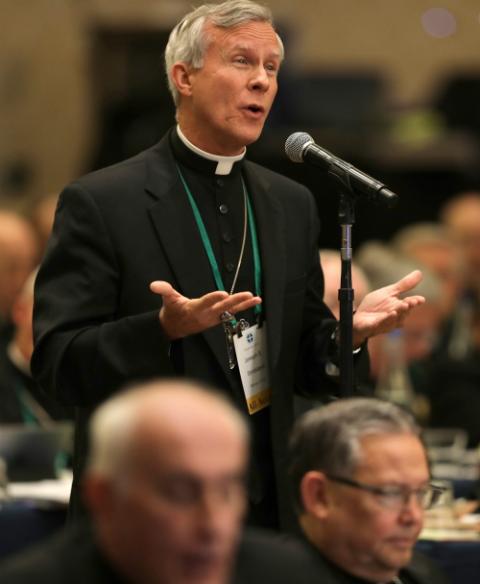
Joseph Strickland of Tyler, Texas, speaks from the floor during the U.S. bishops' assembly in Baltimore Nov. 11, 2019. (CNS/Bob Roller)
Preeminent is defined as "surpassing all others."
"It is not Catholic teaching that abortion is the preeminent issue that we face as a world. In Catholic social teaching, it is not," McElroy said from the floor, adding that the longer quotation from Pope Francis makes that clear.
"Let's at least give the pope a fighting chance with his view," he said.
But several bishops advanced quickly to the microphone to respond to McElroy. Bishop Joseph Strickland of Tyler, Texas, who was one of the first U.S. bishops to support Archbishop Carlo Viganò's attack on Francis last year, said, "I absolutely think 'preeminent' needs to stay."
Philadelphia Archbishop Charles Chaput received applause for his comment, "It has been very clearly the articulated opinion of the bishops' conference for many years that pro-life is still [the] preeminent issue."
In the end, the bishops voted 143-69, with four abstentions, to retain the word "preeminent" and to not add a lengthier quotation from Francis. The adoption of the letter passed, 207-24, with five abstentions.
Bishop John Stowe of Lexington, Kentucky, told NCR that he agreed with McElroy and expressed concern that claims of abortion as exclusively important "has been exploited for too many elections."
"The whole point of the pope's teaching is we have to be consistent across the board," he said. "Life issues are life issues."
At a later press conference, Cardinal Joseph Tobin of Newark, New Jersey, said that if he understood correctly McElroy's intention of "warning against exclusive choices of either/or" or highlighting abortion "to the point that other issues disappear," then "he was right."
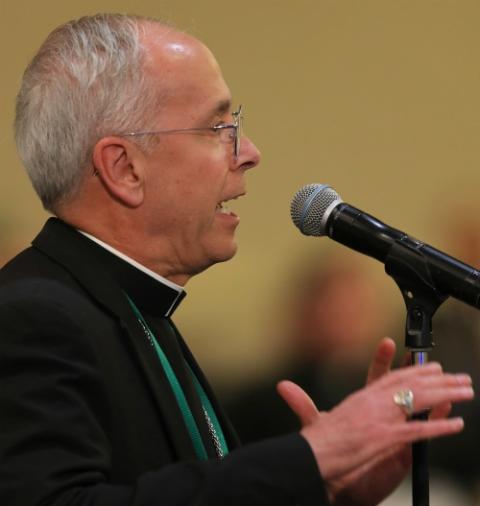
Bishop Mark Seitz of El Paso, Texas, speaks from the floor during the U.S. bishops' assembly in Baltimore Nov. 12. (CNS/Bob Roller)
Bishop Mark Seitz of El Paso, Texas, warned against "pitting one life issue against another," while acknowledging that individuals may be more committed to one issue or another.
"It's not a debate about whether one is more important than the other," he told NCR, "but simply to say all of these issues bear our serious attention."
Seitz, who has a long history of involvement in the anti-abortion movement, said it was "natural" for him to turn to the task of supporting migrants and refugees at the border, "who are facing the horror of being unwanted because of their origin" and "have no place to go, very few options in life," he said.
Last month, he released a powerful pastoral letter on racism after a mass shooting in his diocese that targeted Latinos. At the meeting, he said, he witnessed a "high level of support" and a "new level of interest and passion" on issues of race and immigration from fellow bishops.
"Certainly, you'll find varying amounts of focus — and perhaps even understanding — but it's such a fundamentally Christian, Gospel issue that I think the bishops of the church get it," Seitz told NCR.
Yet not all Catholics in the pews are similarly convinced, he said, adding that many are made fearful by anti-immigrant rhetoric in the culture.
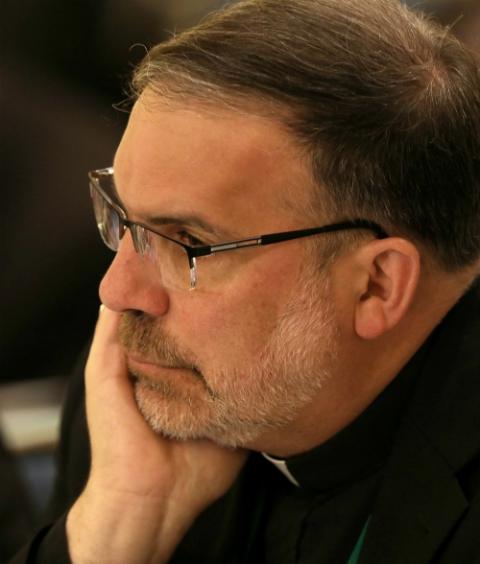
Bishop John Stowe of Lexington, Kentucky, listens to a speaker during the U.S. bishops' assembly in Baltimore Nov. 12. (CNS/Bob Roller)
Stowe said he would like to see the bishops' support of immigrants, as well as environmental issues, more central to their discussion and better connected other life issues. Immigration is "seen by too many Catholics as a fringe or special-interest issue, rather than essential to who we are," he said.
The bishops also have to be "prophetic" about denouncing the racism that has become more visible during the Trump administration, he said.
The bishops are "irresponsible" for not writing a new document on today's current political issues, Stowe said. "After the Trump administration and with the pontificate of Pope Francis, just to bring out this old 'Faithful Citizenship' document that gets misquoted or selectively quoted election after election is not helpful."
Seattle Archbishop Paul Etienne told NCR that he thought the exchange about abortion "took the air out of the room" and proved a distraction.
"It was a good example of these polarizing views that are crippling us," he said.
Etienne recalled Francis' message to U.S. bishops at a January retreat following last fall's meeting, in which he urged unity. "He said, 'You guys need to get together,' " Etienne said. "And we're not yet."
[Heidi Schlumpf is NCR national correspondent. Her email address is hschlumpf@ncronline.org. Follow her on Twitter @HeidiSchlumpf.]





